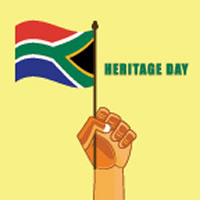In celebration of South Africa’s rich cultural diversity and its people, the country will mark Heritage Day on 24 September.
Heritage Day gives us an opportunity to learn about each other’s cultures and celebrate our differences.
This year marks 20 years since that first Heritage Day was celebrated in 1996 and a number of events will take place across the country to commemorate it. The main event on 24 September will feature a presidential address to the nation. The theme is “Human treasures and legends: Our living heritage”.
Heritage is both tangible and intangible. Tangible heritage refers to buildings, historic places, artefacts and monuments, while intangible are attributes that we have inherited from the past generations such as language and knowledge.
Celebrating our heritage means embracing our cultures, oral and traditional expressions, languages, performing arts, social practices and rituals, food and other aspects that make us unique.
In South Africa, we also celebrate our liberation heritage when we recall the sacrifices made in the struggle for freedom and also honour those who dedicated their lives to ensuring that the country achieved freedom and democracy.
Celebrating and reflecting on our liberation heritage helps promote national building and brings all the people of South Africa closer together.
As part of celebrating our liberation heritage, this year South Africa, in partnership with Mozambique, will mark the 30th anniversary of the death of former Mozambican President Samora Moises Machel.
On 19 October 1986, Machel and 34 of his country men and women died in a plane crash.
He had attended a Frontline States summit in Lusaka, Zambia, and was on his way back to Maputo, Mozambique aboard his presidential plane. The plane mysteriously crashed on the on the hills of Mbuzini, in Mpumalanga, South Africa.
In 1998, South Africa’s Truth and Reconciliation Commission launched a special investigation into Machel’s death. However, the special investigation didn’t reveal anything new.
Machel became the first black president of Mozambique in 1975, after the Front for the Liberation of Mozambique (Frelimo), overcame the colonial Portuguese government in 1974.
Machel supported South African liberation fighters in their struggle against apartheid rule and allowed them to operate within Mozambique. As such, the ties between South Africa and Mozambique have been cemented over years of friendship and support.
An event marking the 30th anniversary of Machel’s death will be held on 19 October at Mbuzini in Mpumalanga.
President Jacob Zuma will address the event, which is expected to be attended by South Africans and Mozambicans.



 Facebook
Facebook Twitter
Twitter WhatsApp
WhatsApp